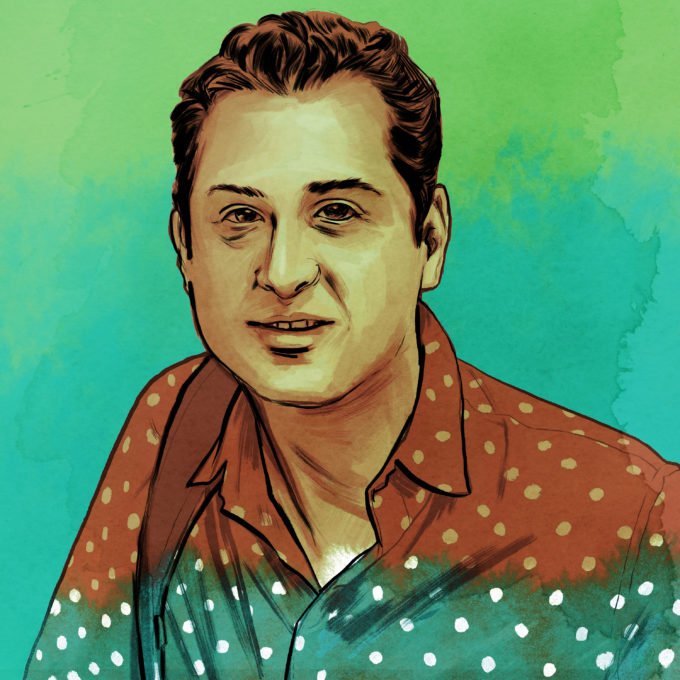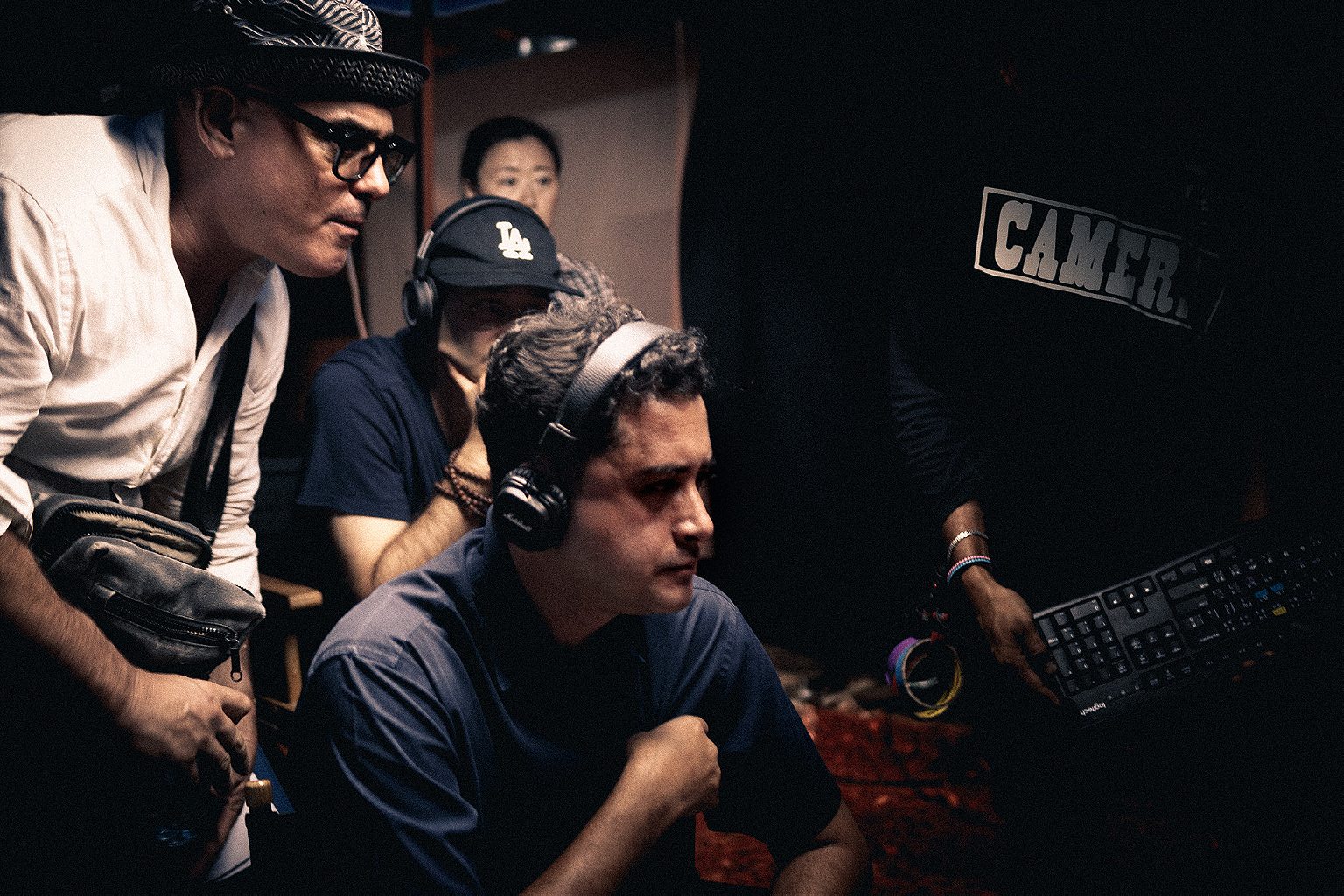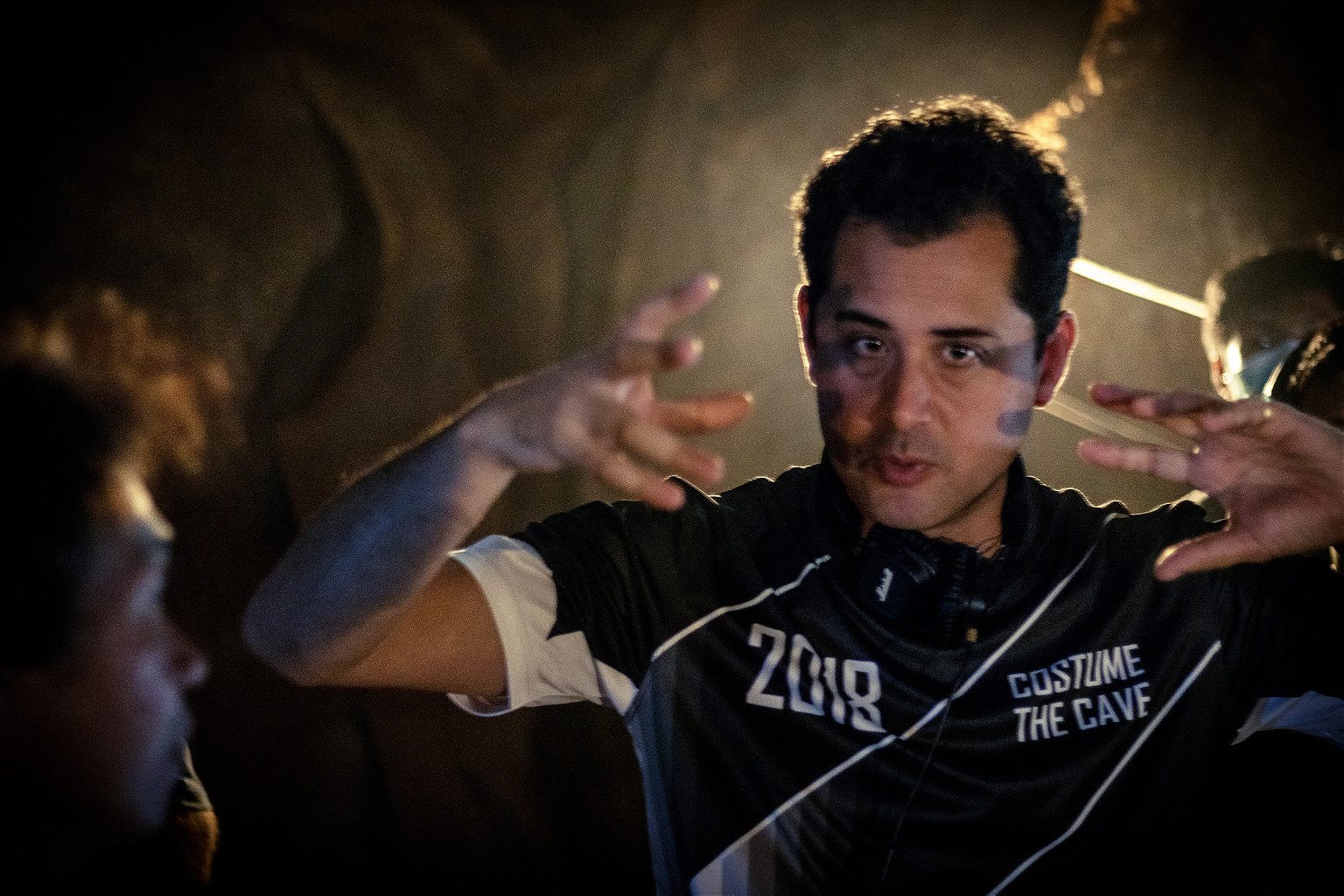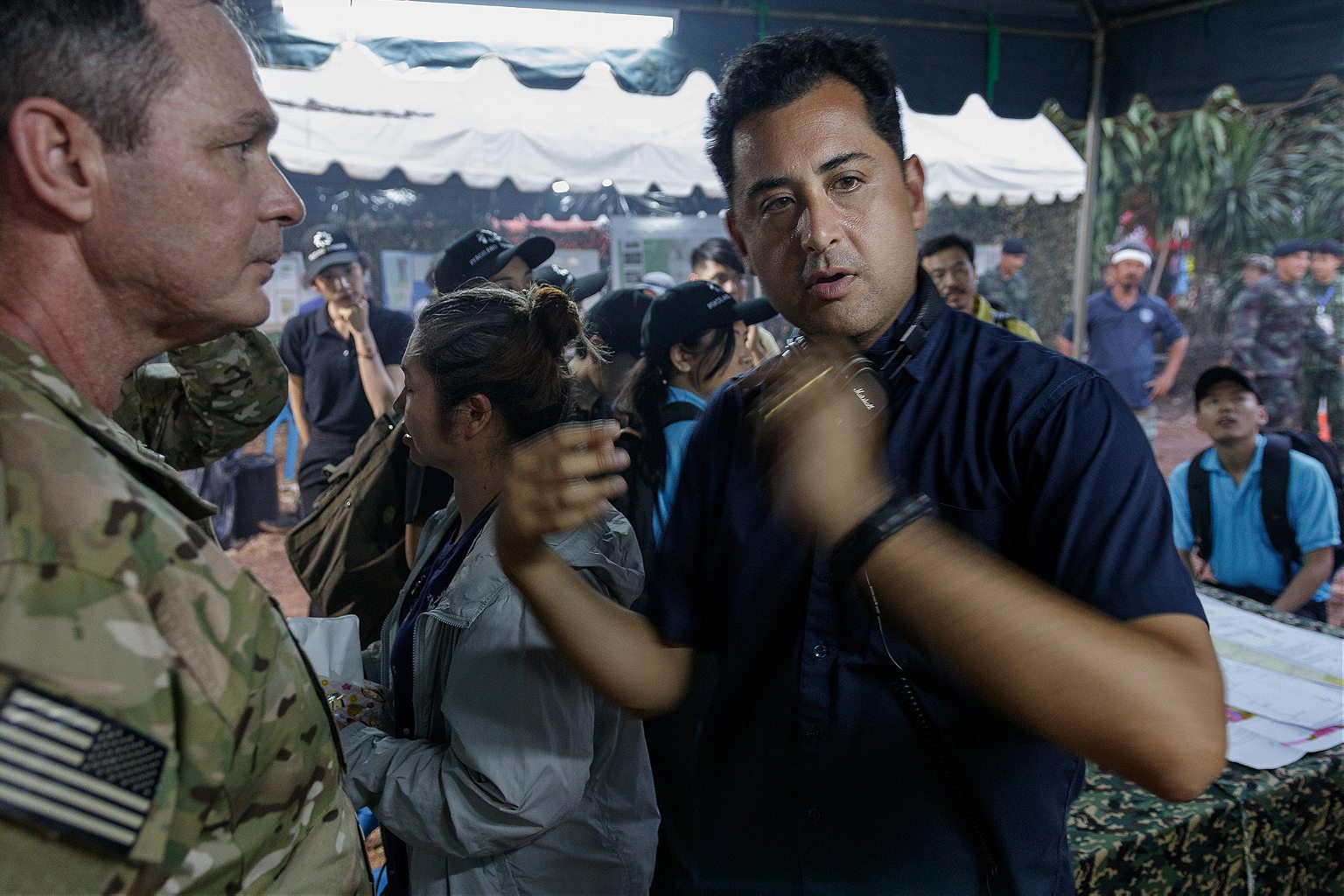
Creating Thai Cinema with Tom Waller

Thai filmmaker Tom Waller talks Thai iced tea, government censors, and his upcoming movie about the dramatic 2018 Tham Luang cave rescue.
In this week’s episode, you’ll hear the bird call of the Asian koel, but the real soundtrack of Bangkok is the internal combustion engine: the mopeds, Mazda 2s. It’s a city of perpetual motion. Just be sure to look both ways before crossing.
This is the first of three episodes we’ll be running from Thailand. We’re starting off with Tom Waller, a Thai-Irish filmmaker who took Nathan for a classic Bangkok morning fix—roadside Thai iced tea—and chatted with Nathan at his home studio about a big film he’s making, The Cave. It’s the only Thai-led film in the works about the dramatic Tham Luang cave rescue in Chiang Rai. They talked about smog, tea, and filmmaking in the Kingdom of Thailand.
Here is an edited and condensed version of Nathan and Tom’s conversation. You can listen to the full episode, for free, on Apple Podcasts, Stitcher, Spotify, or wherever you get your podcasts.
Nathan Thornburgh: It’s a beautiful morning in Bangkok, despite the fact that there’s smog. Your daughters are here, instead of at school.
Tom Waller: They should be at school, but they’re not because the government has decided that the best thing to do with all the pollution is to just cancel school.
Thornburgh: Just cancel it altogether. The government is clearly run by a fifth-grader who doesn’t want to go to school. The good things about Bangkok, at least for the casual observer on my walk over to your place this morning, are it’s warm and the street food is amazing. We’ve got Thai iced tea that looks a lot like the Thai iced tea that we might have in the States.
Waller: It kinda gets better as the ice melts because it’s so concentrated with sugar that you kind of get a sense that you’re going to become diabetic if you drink too many of these.
Thornburgh: The good news about Bangkok is that even at the end of January the ice melts very quickly. It always has that going for it.
So, you mentioned the Thai government, and one of the things that filmmakers have to reckon with in this country is getting their work past the government. That’s been something that you’ve talked about with your movies like the Last Executioner, which you can watch on Netflix. I would imagine, especially with this movie coming out The Cave, which is about the rescue of the Thai soccer team that was stuck in a cave. The rescue captured the world’s attention. Was there extra pressure, because this is such an iconic Thai story, and to get it right?
I’ve got firsthand information from a lot of the unsung heroes of the rescue
Waller: Well, it’s kind of the uncensored story. We were subject to censorship in the sense that every Thai film has to be seen by a committee before it can be shown in the cinemas. But we were able to make the film without passing the script through any government body. So, this was the key to being able to make the film quickly because as soon as you have to go through a committee, then you’re talking about weeks or months of just procrastination. I was able to jump on the story was because I am a Thai national, and I’m living here, and I have a Thai company.
As you know, it was an international rescue effort. I think a lot of people don’t realize how many foreigners were involved in actually extricating the boys from the cave. That was really the thing that surprised me even when I heard the story for the first time from one of the foreign divers. I was amazed at how little the Thai authorities had to do with the final plan.
Thornburgh: That’s fascinating because one of the reasons why you wanted to make it quickly is because Hollywood has its sights on this film and, I guess, the government here is waiting for that huge production company to come in. So, they’ve put a lot of the characters and locations kind of off-limits even to you as a Thai director.
Waller: That was the challenge of making the film without permission, is that you don’t have access to government agencies. You can’t just say, “Can we go shoot in the cave?” It was very difficult to get access and we lobbied for months and we only recently were granted access because they ran out of excuses. They said, “Oh, well, if you’ve already made the film, yeah, we think we can probably make a phone call and see whether you can go in there and get some shots or whatever.” And that came was an amazing kind of a relief because all this time we’ve been navigating the bureaucracy. No one wants to talk to you. It’s a sensitive subject for the Navy Seals.
But what you can do is talk to Americans, to the Brits, to the foreign divers. You can ask them what went on in the cave. You can read about it now because they’ve all written books and they’re coming out with more information. But you can get accurate information from the foreign participants because they’re not controlled by the Thai government. That’s really where my story comes in. I’ve got firsthand information from a lot of the unsung heroes of the rescue, so my film really concentrates on their untold stories.


Thornburgh: It’s a fictionalized version, but some of the people in the film are playing themselves.
Waller: It’s based on a true story. It’s inspired by the real events and it’s the attention to detail is there in that the divers would not have played themselves if they felt that they were doing something phony or they were like hamming it up, you know. So, they play themselves because they are the most qualified participants of the film because they were also the participants of the rescue.
Thornburgh: The making of the film brings up so many fascinating things. Part of the issue that we see in Hollywood when you have someone like John Chu, who’s now a legit Hollywood power, is sort of coming in and saying, you know, “Hey, we’re not going to whitewash this.”
Meanwhile, you’re a Thai director. You live here.
Waller: I’ve made Thai films.
Thornburgh: Your film is going to surprise Thai audiences because of how much foreign involvement there was [in the rescue].
Waller: They saw the news on Thai TV. They saw it through Thai newspapers. The rest of the world saw things unfold on CNN. You saw it unfold on whatever national news program was playing in the country where you were at the time of the rescue.
People were watching and their hearts were beating. When Saman Gunan passed away, this was like a huge thing, not just for Thailand. It was almost like everyone went into national mourning for this ex-Navy Seal who they didn’t even know. And that’s when they called on civilian divers to come and assist them.
Thornburgh: So, you’ve finished shooting the film.
Waller: We’re in post-production now.
Thornburgh: When is it going to the censors?
Waller: We’ll probably show the film to censors in April.
Thornburgh: And that’s after the March 24 election.

Waller: Luckily, an election has been called and luckily it won’t be Prayuth Chan-ocha’s government, I don’t think, censoring the film.
Thornburgh: That’s the songwriting ex-general prime minister who you don’t want to be in charge of sort of deciding whether you’re upholding Thai dignity.
Waller: It’s not really about Thai dignity. I think we do uphold Thai dignity. There is a lot of patriotic symbolism in the film, and there are a lot of scenes that show the Thai Seals doing their job. But, you know, we were not given access to firsthand information about the Thai side of the operation. When it comes to the Thai story, I’ve centered the characters who are kind of bystanders or people not directly involved in the command chain.
I tell the story of the rice farmers whose fields were flooded. I tell the story of a water pump engineer who called and couldn’t get access to the cave because he didn’t have the right permit. That’s something that’s a theme that sort of comes out in the movie is the bureaucracy of Thailand actually made it very difficult for local people to help. They came along and they just were like, oh, I’ve got a water pump, I want to help. And they’re like, sorry, you can’t come in. You don’t have the right permit to be in here. Whereas the foreigners were welcomed with open arms because they had specialist skills that the Thais maybe didn’t have.
The 13 foreign divers who involved in the final [rescue] plan weren’t Thai. They had come from all over the planet. There was a Finnish diver who flew from Malta. There was a Belgian diver who flew from Ireland. There was a Canadian diver. It was kind of like recruiting the Avengers.
Thornburgh: Selflessness of the international community and the volunteerism of the Thai community. So this story is about how they came together and how, despite the death of the ex-Navy Seal, this was a success story. Is that something you gravitated to?
Waller: I wanted to make the film because I just felt that the human story is really interesting. We know what happens at the beginning of the film, of the story. We see in the film the boys getting stuck in the cave. We know what happens at the end. But how do you make that into an interesting film? It’s the middle bit that we’re really interested in.
Thornburgh: Let me ask you, what’s the state of the state of Thai cinema these days?
Waller: It’s horrible. I’m a judge for the Thai film awards and so I have to watch a lot of films. I watched 45 Thai movies to assess them for awards potential. Luckily there were four or five movies that really stood out. But the quality of the films in Thailand has been getting… I suppose it’s because of the budget side. Because basically the box office share of Thai films is tiny now compared to what Marvel movies make. The Avengers is like the box office king. Aquaman is king of the box office.
Thornburgh: You had mentioned your Thai film, The Last Executioner, which came out right after the coup, came out right with Planet of the Apes.
Waller: It was sandwiched between two Leviathan Hollywood releases in the summer. So we had, you know, a monkey riding a horse on one poster, and a dinosaur fighting a robot on the other. It was just very painful to see that film, which I’d spent a year making…
Thornburgh: It’s a beautiful film by the way. I recommend everybody watch it.
Waller: The Last Executioner was relegated to being that film that came out for a week, and no one saw it. Luckily you can see it on Netflix now.
Thornburgh: Just not enough budget. Not enough attention.
Waller: I think that’s why this film hopefully will change things since it’ll be a Thai film that people see overseas. I think it has the subject matter that everyone is interested in and that’s really the key to any film, really. Usually, with my films, no one’s interested in the [actual] filming of it. No one’s interested in the financing of the films, but with this film, it’s kind of the polar opposite. People are super interested in what we’re doing. It’s so unprecedented because I’m so used to kind of making movies in the dark and no one knowing what I’m doing and no one even seeing the films. I hope they go and see the film. Fingers crossed.
Thornburgh: I mean there’s a hell of an argument for national cinema, right? You deserve the right to tell your own stories in your own way. When Hollywood takes all the oxygen out of the room, a lot of countries are left not able to do that.
I just flew in from New York about eight hours ago, and I’m really excited that we got to cross paths even for a brief time. I cannot wait to see this film.
Waller: Thank you very much.
You can listen to the full episode, for free, on Apple Podcasts, Stitcher, Spotify, or wherever you get your podcasts.
Episode 29 Show Notes
Up Next
Tokyo Fixing with Shinji Nohara
Japanese Love Hotels with Toko Sekiguchi
Host Nathan Thornburgh finds himself, yet again, in a Japanese love hotel watching porn and knocking back shochu with his old friend, the Tokyo journalist Toko Sekiguchi.
Yasmin Khan Cooks Her Way through Palestine
Writer Yasmin Khan, author of the new cookbook Zaitoun, whips up an Old Monk hot toddy and talks about the joys of Palestinian cooking.
What Jason Rezaian Learned as a Prisoner in Iran
Journalist Jason Rezaian, the author of the new book Prisoner, talks about his 544 days of imprisonment in Iran, what he thinks of his captors, and his stubborn hopes for Iranian society.
Illustrator Edel Rodriguez is Stress‑Testing Democracy
Edel Rodriguez talks with Nathan Thornburgh about how his childhood in Cuba makes him uniquely equipped to illustrate our troubling political climate.






